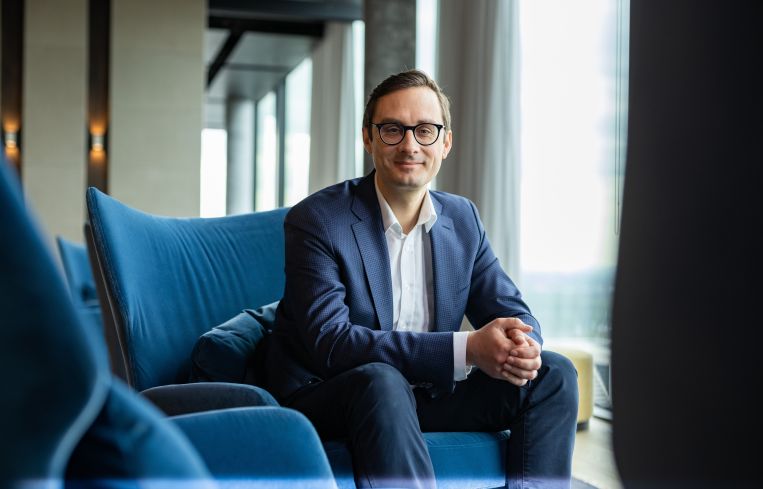5 Questions With Commerz Real CEO Henning Koch at MIPIM
By Nicholas Rizzi March 16, 2023 9:43 am
reprints
Commerz Real, the investment manager of the German-based Commerzbank, has been making some big splashes in the United States real estate market since coming into the country six years ago.
In 2021, Commerz picked up the redeveloped office tower at 100 Pearl Street for $850 million — one of the priciest office buys in New York City that year — and last year bought 1900 N. Street in Washington, D.C., in a deal valued at $265 million. It currently has 12 properties spread across New York, Seattle, Chicago, Miami and D.C.
And Commerz isn’t done yet in the States. Last year, the firm opened an office in New York to be closer to its assets and have boots on the ground to scope out more deals, hoping to get a foothold in more markets, including Boston.
“When we started we did everything from Germany, so without any local offices it was pretty tough and challenging [but] I think we did quite well,” said Henning Koch, the CEO of Commerz. “For us, now we see that the U.S. markets are quite ahead of the European markets. … The cap rates are much higher than in Europe.”
Commercial Observer sat down with Koch at MIPIM 2023 in Cannes, France, to talk about the German firm’s U.S. plans. This interview has been edited for clarity and length.
Commercial Observer: New York tends to get a lot of interest for overseas capital. What made you decide to get into places like Florida and D.C.?
Henning Koch: It’s just a matter of diversification. You really want to spread out in order to be invested in the major gateway markets and gateway cities. We are not the guys just flying in and buying in Austin or Dallas. These markets are a bit too small and not liquid enough for us. So our strategy is always to be invested in really liquid markets where you can get in and get out whenever you want to do so. We feel quite comfortable with the markets we entered in.
Boston is still a quite an interesting city as well, but was always pretty expensive, really difficult to get into. Maybe this will be changing now when we have a local team on the ground. It makes it easier, maybe, to get access.
I know the strategy for a lot of overseas investors has been to park money long term in New York City. Is that still what you’re doing?
Yeah, at the end we are long-term driven. Now, on the other side, I like making some profits during that time. It’s just always good to give the evidence to the markets and to your investors that you are in a position, not just buying, but also selling and successfully selling an asset.
The last six or seven years it was time to just build up a footprint in the United States. Now it’s more focusing on asset management and focusing on some of the issues.
I’ve heard from a lot of people at this convention that they are shying away from office properties. Is that your strategy as well to focus on other assets?
I strongly believe in offices. At the end, we all still need offices. But you need really creative, cool, trendy and maybe a bit of lifestyle-driven office space in order to attract people to come to the office. And the proper location in our opinion is key.
At the end, it’s not just about office. It’s more to see mixed-use buildings, to integrate mixed-use services into the office space. I think we need to think about it a bit more creatively and think about ecosystems where you integrate various things together and combine them in a really intelligent way that I think is more the future in order to make the city centers pretty attractive.
ESG has been a huge goal for European firms investing in real estate. Are you carrying that over when looking at assets in the States?
Completely. ESG is a must-have. The word ESG is starting to be boring already, but in the end it’s a must-have. It’s such a full-integration part of every redevelopment and every asset management for us. What I’m afraid of right now, given that we are facing a crisis at the moment and it’s more difficult to bring your [profit and losses] in order, is that you’re saving on the wrong side and that you start saving in ESG expenditures. I think this is a big mistake. We really need to push forward the sustainability aspect.
We need to look at the existing stock. It’s not about new-build culture. It’s about remodeling and reconversion. We really need to start thinking about how to convert all this older stock into really modern, vibrant dynamic space.
What are the plans and goals for your U.S. operations in the next year?
Really monitoring closely the markets and waiting for the right opportunities, that’s the principal strategy. We have just maybe done one or two deals per year. We could do one or two deals [this] year, but we [don’t] have to do it. So if the right opportunities are there, fine.
We clearly compare with other markets globally to see where is the best value to be bought in right now. And, of course, we really look at high-yield investment right now because we really need to push up the fund’s performance. So, therefore, cash and cash returns are quite important for us as well.
Nicholas Rizzi can be reached at nrizzi@commercialobserver.com.



